Wyoming nursing home background checks require comprehensive criminal history screening, FBI fingerprinting, and state-specific compliance measures that differ significantly from other states' requirements. Healthcare employers must navigate strict HCBS waiver requirements and a 47% CNA shortage while maintaining rigorous screening standards to protect vulnerable populations.
Key Takeaways
- Wyoming nursing homes must conduct both state and federal background checks including FBI fingerprinting for all direct care staff positions.
- The Wyoming Department of Health maintains a centralized abuse and neglect registry that employers must check before hiring healthcare workers.
- Background check processing typically takes 5-10 business days, with expedited options available for urgent staffing needs.
- Disqualifying offenses include violent crimes, financial exploitation, drug-related convictions, and any abuse or neglect findings within the past five years.
- HCBS waiver providers face additional screening requirements and must maintain ongoing monitoring of employee backgrounds.
- Staffing agencies can streamline the Wyoming nursing home background check process by partnering with certified screening providers who understand state-specific requirements.
Wyoming Background Check Requirements for Nursing Home Staff
Wyoming nursing home background check regulations mandate comprehensive screening for all employees who provide direct patient care or have unsupervised access to residents. Additionally, the Wyoming Department of Health requires facilities to verify criminal history, professional licensing status, and abuse registry clearance before allowing staff to begin work. Furthermore, these requirements apply to both permanent employees and temporary staffing agency workers.
Healthcare facilities must obtain results from multiple screening sources within specific timeframes. Moreover, the state requires both Wyoming criminal history checks and FBI fingerprint-based background investigations for comprehensive coverage. Consequently, employers must verify that applicants do not appear on state or federal exclusion lists that would prohibit their employment in healthcare settings.
The regulatory framework also extends to volunteers and independent contractors who have regular contact with residents. Similarly, maintenance staff and administrative personnel with potential resident access must undergo modified screening procedures. Therefore, facilities must develop comprehensive policies that address all worker categories while maintaining consistent compliance standards.
Legal Framework and Regulatory Authority
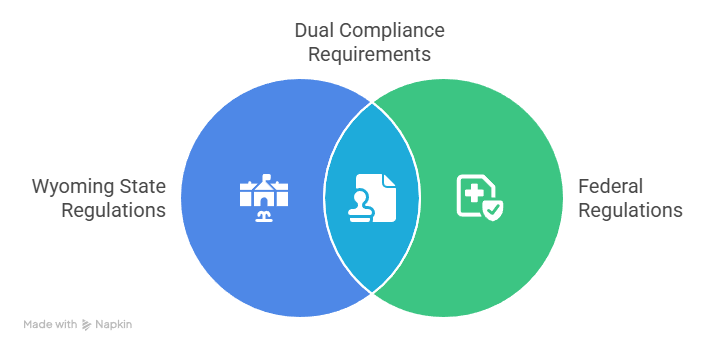
State Legislative Requirements
Wyoming's nursing home background check requirements stem from multiple legislative sources that work together to protect vulnerable populations. Specifically, Wyoming Statute Title 35 establishes the fundamental framework for healthcare facility regulation and employee screening standards. Meanwhile, the Wyoming Department of Health Administrative Rules provide detailed implementation guidance for facility operators.
The legislative framework also incorporates federal requirements from the Centers for Medicare & Medicaid Services and the Department of Health and Human Services. As a result, Wyoming facilities must comply with both state-specific provisions and federal standards that may overlap or exceed local requirements. This dual compliance structure requires careful attention to the most restrictive provisions from either regulatory source.
Federal Compliance Integration
Federal regulations significantly impact Wyoming nursing home background check procedures through Medicare and Medicaid participation requirements. Furthermore, the Patient Protection and Affordable Care Act introduced additional screening mandates that affect all healthcare providers receiving federal funding. Consequently, Wyoming facilities must integrate these federal requirements into their existing state compliance programs.
The Fair Credit Reporting Act also governs background check procedures, particularly regarding adverse employment decisions and candidate notification requirements. Additionally, Equal Employment Opportunity Commission guidelines influence how facilities evaluate criminal history information during hiring processes. Therefore, employers must balance thorough screening with fair hiring practices that comply with federal anti-discrimination laws.
Step-by-Step Wyoming Nursing Home Screening Process
Initial Application and Documentation Review
The screening process begins with collecting required documentation from job candidates before conducting formal background investigations. Initially, applicants must provide government-issued identification, Social Security cards, and signed authorization forms permitting comprehensive background screening. Subsequently, healthcare employers should also verify employment eligibility through I-9 documentation and confirm professional licensing status through the Wyoming Board of Nursing or relevant regulatory body.
Required Documentation Components:
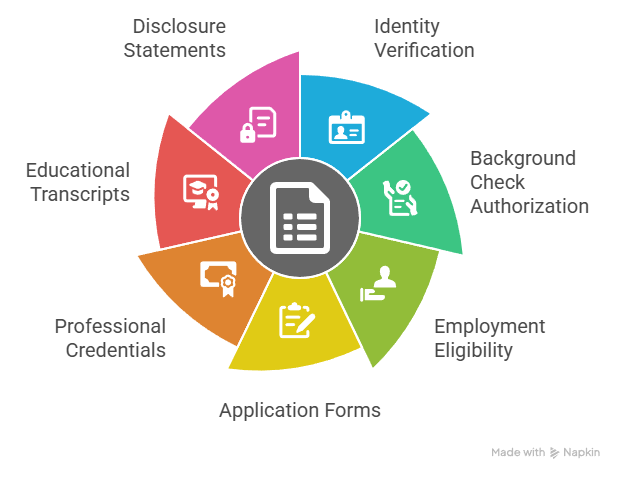
- Government-issued photo identification and Social Security card for identity verification
- Signed background check authorization forms with FCRA compliance language
- I-9 employment eligibility documentation including acceptable work authorization documents
- Completed application forms with detailed employment history and gap explanations
- Professional license numbers and certification credentials relevant to the position
- Educational transcripts or diplomas from accredited nursing programs
- Disclosure statements for previous criminal convictions, disciplinary actions, or abuse findings
This initial review helps identify potential red flags before investing resources in formal background investigations. Therefore, thorough documentation review prevents wasted screening costs on unqualified candidates while ensuring compliance with federal employment verification requirements.
Criminal History Investigation Requirements
Wyoming nursing homes must conduct both state and federal criminal background checks to meet compliance standards. First, state-level searches include Wyoming criminal history records, while federal screening involves FBI fingerprint analysis covering all U.S. jurisdictions. Next, the process typically requires candidates to visit authorized fingerprinting locations or mobile services arranged by their prospective employers.
Criminal Background Check Requirements:
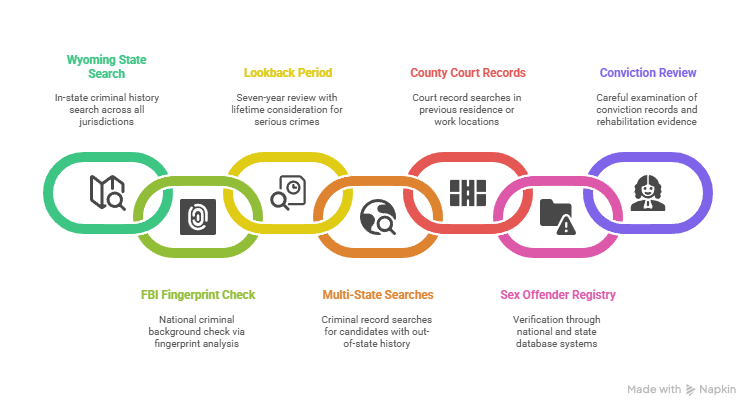
- Wyoming state criminal history search covering all in-state jurisdictions and court systems
- FBI fingerprint-based national criminal background check through authorized live scan locations
- Seven-year lookback period for most offenses with lifetime consideration for serious crimes
- Multi-state criminal record searches for candidates with out-of-state residence history
- County-level court record searches in jurisdictions where candidates previously lived or worked
- Sex offender registry verification through national and state database systems
- Careful review of conviction records considering offense nature, timing, and rehabilitation evidence
The fingerprinting process requires live scan technology at certified locations throughout Wyoming. Therefore, employers should provide clear instructions and potentially arrange group fingerprinting sessions to streamline the process for multiple candidates while ensuring accurate identification verification.
Professional License and Credential Verification
Professional licensing verification represents a critical component of Wyoming nursing home background checks that requires careful attention to detail. Initially, employers must verify current license status through the appropriate state board, such as the Wyoming Board of Nursing for certified nursing assistants and registered nurses. Subsequently, facilities should confirm that licenses remain in good standing without pending disciplinary actions or restrictions.
Professional Verification Components:
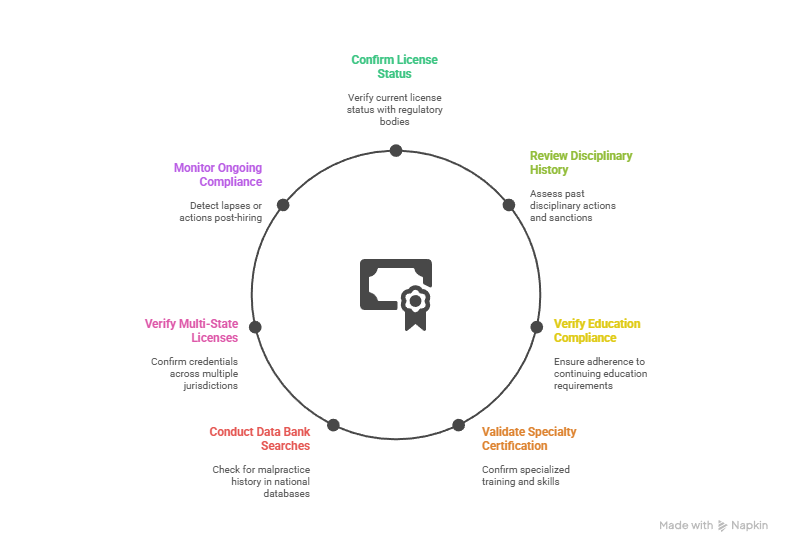
- Current license status confirmation through Wyoming Board of Nursing or relevant regulatory bodies
- Disciplinary history review including any sanctions, suspensions, or conditional licensing arrangements
- Continuing education compliance verification to ensure current professional development requirements
- Specialty certification validation for positions requiring advanced skills or specialized training
- National Practitioner Data Bank searches for licensed healthcare professionals with malpractice history
- Multi-state license verification for professionals holding credentials in multiple jurisdictions
- Ongoing monitoring procedures to detect license lapses or disciplinary actions after hiring
This comprehensive credential review ensures that staff members possess both legal authorization and practical qualifications for their assigned responsibilities. Furthermore, credential verification requires both thorough initial screening and continuous monitoring throughout employment to maintain ongoing compliance with professional standards.
Required Screening Components and Databases
Wyoming nursing home background checks must include searches of multiple databases and registries to ensure comprehensive coverage. First, the Wyoming Abuse and Neglect Registry contains records of substantiated findings against healthcare workers and caregivers statewide. Additionally, employers must also check federal databases including the Office of Inspector General exclusion list and System for Award Management debarment records.
Professional licensing verification requires checking with relevant state boards and national databases like the National Practitioner Data Bank. Moreover, additional components include Social Security number verification, address history confirmation, and reference checks with previous healthcare employers. Consequently, these multiple verification layers help create a complete picture of candidate backgrounds and potential risk factors.
Required Database Searches:
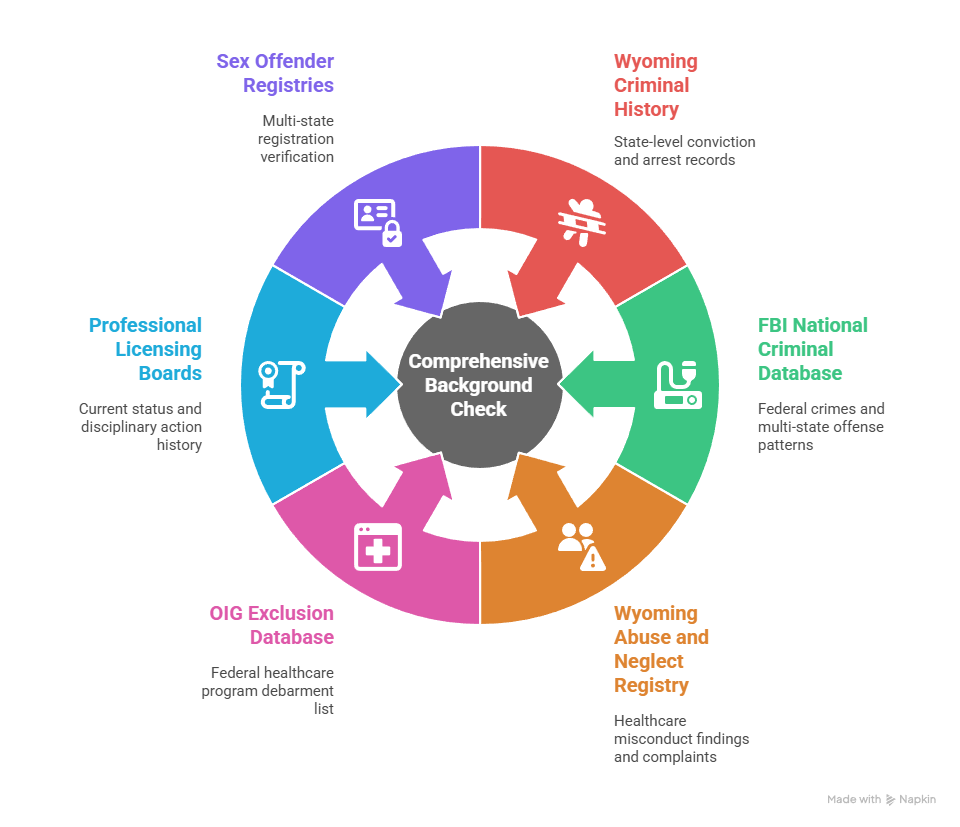
- Wyoming Criminal History Records: State-level conviction and arrest records covering all jurisdictions within Wyoming
- FBI National Criminal Database: Federal crimes and multi-state offense patterns from nationwide sources
- Wyoming Abuse and Neglect Registry: Healthcare-specific misconduct findings and substantiated complaints
- OIG Exclusion Database: Federal healthcare program debarment list updated monthly by CMS
- Professional Licensing Boards: Current status verification and disciplinary action history review
- Sex Offender Registries: Multi-state registration verification through national database systems
These database searches must be completed before candidates begin work in patient care roles. Furthermore, results from all sources should be documented and retained according to state recordkeeping requirements. Therefore, employers should establish systematic procedures for organizing and storing screening documentation to facilitate regulatory inspections.
The database search process also includes verification of Social Security numbers through authorized sources to prevent identity fraud. Additionally, employers should conduct address history searches to ensure comprehensive geographic coverage of criminal record checks. Consequently, thorough database screening provides multiple verification points that enhance overall background check reliability.
Disqualifying Offenses and Appeal Procedures
Automatic Disqualification Categories
Wyoming law establishes specific criminal offenses that automatically disqualify candidates from nursing home employment without possibility of appeal. Specifically, these include convictions for homicide, sexual assault, kidnapping, and crimes involving vulnerable adults within any timeframe. Additionally, financial crimes such as embezzlement, fraud, and identity theft also result in permanent disqualification when committed against elderly or disabled individuals.
Additional automatic disqualifiers include substantiated findings of abuse, neglect, or exploitation in healthcare settings within the previous five years. Furthermore, drug trafficking convictions and felony drug possession charges within seven years also prohibit employment in nursing facilities. Therefore, these restrictions apply regardless of rehabilitation efforts or character references provided by applicants.
The automatic disqualification categories also extend to certain property crimes and violent offenses that demonstrate patterns of behavior incompatible with healthcare employment. Moreover, multiple misdemeanor convictions within specific timeframes may collectively result in disqualification even when individual offenses might not. Consequently, employers must evaluate both individual conviction severity and overall criminal history patterns when making employment decisions.
Conditional Approval and Waiver Process
Certain criminal convictions allow for individual consideration through Wyoming's conditional approval process. Initially, candidates with disqualifying offenses may request hearings to present evidence of rehabilitation and fitness for healthcare employment. Subsequently, the waiver process requires detailed documentation including court records, completion of rehabilitation programs, and character references from employers and community members.
The Wyoming Department of Health reviews waiver applications on a case-by-case basis, considering factors such as time elapsed since conviction, severity of offenses, and evidence of behavioral change. Additionally, successful applicants receive conditional approval allowing employment under specific supervision requirements. Therefore, this process typically adds 30-45 days to the standard background check timeline but provides opportunities for qualified candidates with past mistakes.
Waiver applications must include comprehensive documentation of rehabilitation efforts, including completion of treatment programs, community service, and stable employment history. Furthermore, candidates must demonstrate understanding of their past mistakes and provide detailed plans for maintaining appropriate behavior in healthcare settings. Consequently, the waiver process requires significant personal reflection and documentation that supports claims of rehabilitation and changed behavior.
HCBS Waiver and Medicaid Provider Requirements
Home and Community-Based Services waiver providers face additional Wyoming nursing home background check requirements beyond standard healthcare screening. First, HCBS programs serving vulnerable populations must conduct enhanced criminal history investigations and implement ongoing monitoring systems. Additionally, these providers must also verify worker qualifications through specialized training databases and competency assessments.
Medicaid-funded facilities must comply with federal screening requirements including monthly OIG exclusion list monitoring and annual background check updates. Moreover, the Centers for Medicare & Medicaid Services mandate specific documentation and reporting procedures that Wyoming providers must follow to maintain program participation. Consequently, non-compliance can result in funding suspension and facility closure orders.
Enhanced HCBS Requirements:
| Component | Standard Facilities | HCBS Waiver Providers |
| Background Check Frequency | Pre-employment only | Annual updates required |
| Database Monitoring | OIG quarterly | OIG monthly plus state registries |
| Training Verification | Basic competency | Specialized HCBS curriculum |
| Supervision Requirements | Standard oversight | Enhanced monitoring protocols |
| Documentation Standards | Basic compliance files | Comprehensive tracking systems |
These enhanced requirements reflect the increased vulnerability of HCBS populations and federal funding accountability standards. Furthermore, providers should budget additional time and resources for comprehensive compliance management. Therefore, HCBS waiver facilities often require specialized staff training and dedicated compliance personnel to manage these complex requirements effectively.
The enhanced monitoring requirements also include quarterly reviews of employee performance and annual competency assessments beyond basic background screening. Additionally, HCBS providers must maintain detailed incident reporting systems and conduct regular audits of employee compliance with enhanced supervision protocols. Consequently, these programs require significantly more administrative overhead than standard nursing home operations.
Processing Timeline and Expedited Options
Standard Wyoming nursing home background check processing requires 5-10 business days for complete results from all required sources. Initially, FBI fingerprint analysis typically represents the longest component, though recent system improvements have reduced average turnaround times. Meanwhile, state criminal history searches and registry checks usually complete within 2-3 business days when submitted electronically through certified providers.
Healthcare employers facing urgent staffing needs can access expedited processing options for additional fees. Subsequently, rush services can reduce the total timeline to 48-72 hours for most screening components, though complex criminal histories may require additional investigation time. Therefore, facilities should plan staffing schedules to accommodate standard processing timelines while maintaining adequate patient care coverage.
Processing Timeline Breakdown:
- Wyoming Criminal Records: 1-2 business days for electronic submissions through state systems
- FBI Fingerprint Analysis: 3-5 business days with recent system improvements and automation
- Professional License Verification: 1 business day for active licenses in good standing
- Registry Searches: Same day to 24 hours depending on database availability and complexity
- Reference Verification: 2-3 business days accounting for contact availability and response times
- Complete Report Assembly: 1 business day for final review and quality assurance procedures
Expedited processing can compress these timelines by approximately 50% for urgent hiring situations. However, employers should avoid rushing the screening process at the expense of thoroughness and compliance. Furthermore, expedited services may not be available for all screening components, particularly those requiring third-party verification or manual review processes.
The processing timeline can also vary based on factors such as candidate history complexity, out-of-state residence history, and completeness of initial documentation. Additionally, background check providers may experience seasonal volume fluctuations that affect standard processing times during peak hiring periods. Consequently, employers should build buffer time into their hiring schedules and maintain relationships with multiple screening providers to ensure consistent service availability.
Cost Structure and Budget Planning
Wyoming nursing home background check costs vary significantly based on screening depth, processing speed, and volume discounts negotiated with providers. Initially, basic compliance packages typically range from $75-150 per candidate, while comprehensive screenings including enhanced database searches can cost $200-350. Subsequently, volume pricing arrangements often provide 15-25% discounts for facilities conducting regular hiring.
Additional costs include fingerprinting fees, expedited processing charges, and ongoing monitoring services for HCBS waiver compliance. Moreover, budget planning should account for failed background checks requiring replacement candidate screening and potential appeal hearing costs. Therefore, healthcare employers should also consider technology platforms that streamline screening workflow and reduce administrative overhead.
Cost Breakdown Analysis:
| Service Component | Basic Package | Comprehensive Package | HCBS Enhanced |
| State Criminal Search | $15-25 | $15-25 | $15-25 |
| FBI Fingerprint Check | $25-40 | $25-40 | $25-40 |
| Professional License Verification | $10-15 | $15-25 | $15-25 |
| Registry Searches | $15-30 | $25-40 | $35-50 |
| Reference Verification | $0-20 | $20-35 | $25-40 |
| Ongoing Monitoring | Not included | $5-15 monthly | $15-25 monthly |
| Total Initial Cost | $75-150 | $125-200 | $150-250 |
The cost structure also includes potential additional expenses for complex cases requiring manual research or international background checks. Furthermore, facilities should budget for technology integration costs if implementing automated screening management systems. Consequently, total screening program costs may exceed individual check fees when accounting for administrative overhead and system maintenance requirements.
Budget planning should also consider the cost of compliance violations, which can result in significant penalties and operational disruptions. Additionally, facilities may need to invest in staff training and compliance consultation services to ensure proper screening program implementation. Therefore, comprehensive budget planning requires evaluation of both direct screening costs and indirect compliance management expenses.
Common Compliance Mistakes and Prevention Strategies
Healthcare employers frequently encounter compliance violations that can result in regulatory penalties and operational disruptions. Initially, the most common mistake involves allowing staff to begin work before receiving complete background check results, which violates state regulations regardless of urgency. Additionally, facilities must implement strict protocols preventing unsupervised patient contact until all screening requirements are satisfied.
Documentation errors represent another significant compliance risk, particularly incomplete record retention and inadequate adverse action procedures. Moreover, employers must maintain detailed screening files for regulatory inspection and follow federal fair credit reporting requirements when taking adverse employment actions. Subsequently, regular compliance audits help identify system weaknesses before they result in violations.
Prevention Strategies:
- Automated Workflow Systems: Prevent premature work authorization through technology controls and mandatory verification checkpoints
- Regular Staff Training: Ensure HR teams understand current requirements and procedures through quarterly education sessions and certification programs
- Documentation Templates: Standardize record-keeping to meet regulatory standards and ensure consistent compliance across all screening activities
- Compliance Audits: Monthly internal reviews of screening processes and outcomes with corrective action plans for identified deficiencies
- Legal Updates: Subscribe to regulatory change notifications and industry guidance to maintain current knowledge of evolving requirements
- Vendor Management: Regular performance reviews of background screening providers including accuracy assessments and compliance verification
These prevention measures help maintain consistent compliance while reducing administrative burden on facility staff. Furthermore, investment in robust systems pays dividends through reduced regulatory risk and improved hiring efficiency. Therefore, proactive compliance management represents a crucial investment in operational stability and regulatory relationship management.
The prevention strategy implementation also requires establishing clear accountability structures within healthcare organizations. Additionally, facilities should designate specific personnel responsible for compliance oversight and provide them with adequate training and resources. Consequently, successful prevention programs require both systematic processes and dedicated personnel who understand the critical importance of maintaining consistent compliance standards.
Conclusion
Wyoming nursing home background checks require careful attention to state-specific requirements and multiple database searches to ensure comprehensive candidate screening. Furthermore, healthcare employers must balance urgent staffing needs with thorough compliance procedures, particularly given the state's 47% CNA shortage and strict regulatory environment. Additionally, successful screening programs combine automated workflow systems with experienced provider partnerships to maintain efficiency while meeting all legal requirements. Therefore, regular compliance audits and staff training help prevent costly violations and protect vulnerable patient populations while supporting sustainable healthcare operations throughout Wyoming.
Frequently Asked Questions
How long does a Wyoming nursing home background check take to complete?
Standard Wyoming nursing home background checks require 5-10 business days for complete results from all required sources. FBI fingerprint analysis typically takes 3-5 business days, while state criminal records and registry searches complete within 1-2 business days. Expedited processing options can reduce the timeline to 48-72 hours for urgent hiring needs, though complex cases may require additional investigation time.
What disqualifies someone from working in a Wyoming nursing home?
Automatic disqualifications include convictions for homicide, sexual assault, kidnapping, financial crimes against vulnerable adults, and substantiated abuse or neglect findings within five years. Drug trafficking convictions and felony drug possession within seven years also prohibit employment. However, some offenses may qualify for conditional approval through Wyoming's waiver process, which considers rehabilitation evidence and time elapsed since conviction.
Do Wyoming nursing homes need to conduct background checks on temporary staff?
Yes, Wyoming requires comprehensive background checks for all direct care staff, including temporary workers provided by staffing agencies. The nursing home facility remains responsible for ensuring compliance even when using agency staff. Staffing agencies may conduct initial screening, but facilities must verify that all required components are completed before allowing temporary workers to provide patient care.
What's the difference between HCBS waiver and standard nursing home background check requirements?
HCBS waiver providers must conduct enhanced screening including annual background check updates, monthly OIG exclusion list monitoring, and specialized training verification. Standard nursing homes typically only require pre-employment screening with quarterly OIG checks. HCBS facilities also face additional supervision requirements and documentation standards due to federal Medicaid funding accountability measures.
How much do Wyoming nursing home background checks cost?
Basic compliance packages typically cost $75-150 per candidate, while comprehensive screenings range from $200-350 depending on the depth of investigation required. Additional costs include fingerprinting fees ($15-30), expedited processing charges (50-100% premium), and ongoing monitoring services for HCBS compliance. Volume discounts of 15-25% are often available for facilities with regular hiring needs.
Can employees start work while their background check is pending in Wyoming?
No, Wyoming regulations prohibit direct patient care or unsupervised facility access until complete background check results are received and reviewed. This applies even in urgent staffing situations or when partial results are available. Facilities may allow orientation activities that don't involve patient contact, but must maintain strict supervision protocols until all screening requirements are satisfied.
Additional Resources
- Wyoming Department of Health Background Check Requirements
https://health.wyo.gov/aging/hcbs/provider-information/background-checks/ - FBI Identity History Summary Checks for Healthcare Workers
https://www.fbi.gov/services/cjis/identity-history-summary-checks - CMS Background Screening Requirements for Long-Term Care Facilities
https://www.cms.gov/Medicare/Provider-Enrollment-and-Certification/SurveyCertificationGenInfo - Wyoming Board of Nursing License Verification Portal
https://nursing-eboard.wyo.gov/license-verification - OIG List of Excluded Individuals and Entities Database
https://oig.hhs.gov/exclusions/ - National Association of Professional Background Screeners Compliance Guide
https://www.napbs.com/resource/healthcare-background-screening
Still have questions?
Get in touch with our team today for a personalized demo and discover how our tailored volume pricing and packages can drive results for your business!
How useful was this page?*
Note: your comments are anonymous. We use them to improve the website. Do not include any personal details.
Visit our FCRA Compliance Tool or leave a message here if you need a response.
From the blog Explore the GCheck Content Hub

How Long Does a Background Check Take? A Complete 2025 Guide
13 Dec, 2023 • 14 min read
The Ultimate Background Check Guide
13 Dec, 2023 • 4 min read
The Ultimate Guide to Employment Background Checks
13 Dec, 2023 • 10 min readThe information provided in this article is for general informational and educational purposes only and should not be construed as legal advice or a substitute for consultation with qualified legal counsel. While we strive to ensure accuracy, employment screening laws and regulations—including but not limited to the Fair Credit Reporting Act (FCRA), Equal Employment Opportunity Commission (EEOC) guidelines, state and local ban-the-box laws, industry-specific requirements, and other applicable federal, state, and local statutes—are subject to frequent changes, varying interpretations, and jurisdiction-specific applications that may affect their implementation in your organization. Employers and screening decision-makers are solely responsible for ensuring their background check policies, procedures, and practices comply with all applicable laws and regulations relevant to their specific industry, location, and circumstances. We strongly recommend consulting with qualified employment law attorneys and compliance professionals before making hiring, tenant screening, or other decisions based on background check information.

